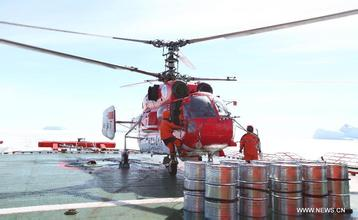Weather permitting, a Chinese helicopter will begin rescue operations for passengers stranded on the Russian icebreaker MV Akademik Shokalskiy, which is stuck in the frozen sea off the coast of Antarctica.
The Russian ship has been stuck there since Dec. 24. The original rescue plan called for either a nearby Australian or Chinese icebreaker to make its way to the stranded Russian vessel but weather conditions have made it impossible or both ships to continue. Fortunately, the Chinese icebreaker also came equipped with a helicopter.
According to Chinese officials, the rescue operations will comprise of three teams of two people each. The flight team will be responsible for operating the helicopter to airlift passengers from the ship to safety. The ground crew will be responsible for ensuring that the helicopter has a safe and secure place for landing and take off. Finally, a people team will be tasked with getting the passengers off the icebreaker and onto the helicopter.
In total, 52 scientists and tourists will need to be rescued from the Shokalskiy. The ship's 22 Russian crew members will remain aboard to navigate the ship once it can free itself from the ice. Chinese officials estimate that the rescue operations should take no more that four hours and five or six flights to get all passengers to safety. Passenger will be ferried from the Shokalskiy to the Australian icebreaker which has the capacity to house the passengers.
The helicopter that will be used is a Kamov K-27 military aircraft that was originally designed for and used by the Soviet Navy. It can comfortably transport 12 people at once and it is known to work well in adverse weather conditions. Unfortunately, while the helicopter can operate in current conditions, the issue is that current weather conditions make it treacherous for passengers to offload onto the ice near the Australian vessel.
The Chinese icebreaker was in the area performing scientific tests when it received the distress signal from the Shokalskiy seeking emergency assistance on Dec. 31.



























